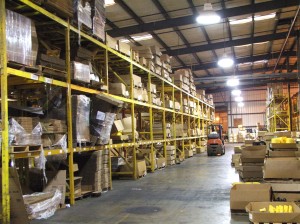Drivers drive trucks. In logistics, this is the number one mode of transportation. Truck drivers require specific licenses which you can receive training for. Commercial driver’s licenses depend on the class of vehicle you are driving, the weight of the vehicle and the type of goods being transported.
Fulfilment is another general term which could mean different things depending on the job listing. Typically a job title of order fulfilment means you are looking after individual customer orders and making sure they are completed. In logistics this typically has a similar meaning to distribution.
Intermodal means more than one mode of transportation. A job in intermodal logistics means you are taking care of air, sea, rail and truck freight and how they interact together. For example, standard shipping containers are carried by ships, trains and trucks without repacking. This is an intermodal form of logistics.
Inventory Management
A job in inventory management means you are responsible for inventory. At the lowest level, this could mean you are hired to count parts, while other jobs in inventory management might be closer to an analyst’s position, where you would perform calculations to ensure correct inventory levels.
Materials Handling
Material handling generally covers the movement of material within a building. A materials handling engineer may be responsible for the design and procurement of conveyor systems, carts and other devices for moving materials around. A material handler could be driving a forklift or moving skids around on a pump truck or tugger.
Materials Management
A materials manager is responsible for the flow of material in the business or facility. Typically, most other logistics jobs within the building will report to the materials manager.
Production Planning
More in-depth than a scheduler, a production planner looks after a larger chain of processes, planning what to run, when to run it. A planner needs to be familiar with customer forecasts with a longer outlook, while a scheduler may be only looking at several days worth of production.
Shipping / Receiving
Shippers and receivers are the people that physically take care of getting product in and out of the building. They are the forklift drivers that put parts on a truck and take them off. They are the people who prepare the packing slips to give to the truck drivers. They receive all product and sign for packages.
Supply Chain
The supply chain is the group of suppliers or companies that bring product to the facility. It’s called a chain because generally there are many links. Your supplier will have suppliers and those suppliers will have their own suppliers. A supply chain manager controls the relationship with all these suppliers and makes sure they are capable of meeting the needs of the business.
Third Party Logistics
Third party logistics refers to another company that is handling the logistics for your business. This can be as simple as a trucking company shipping your parts, but typically refers to large logistics companies that handle everything from shipping, to warehousing and distribution. A third party logistics job might be working for one of these large logistics companies, or could simply be managing the communications between a business and a logistics company.
Traffic
Traffic is similar to dispatch. A traffic coordinator generally deals with the day to day movement of trucks, communicating with drivers and organizing schedules. While dispatch is generally an internal communication, traffic also refers to customer communication.
Warehousing
Warehouses hold product. They don’t make anything. Warehousing managers might be in charge of large, standalone warehouses, or the storage area of a larger facility. They will oversee the daily operations of a warehouse, including the material handling, shipping and receiving.
Logistics
Logistics is a broad area with no standard job titles. Many jobs in logistics have similar titles that mean different things, while many similar jobs have completely different titles. Be sure to carefully read the job description of any job you apply for.
